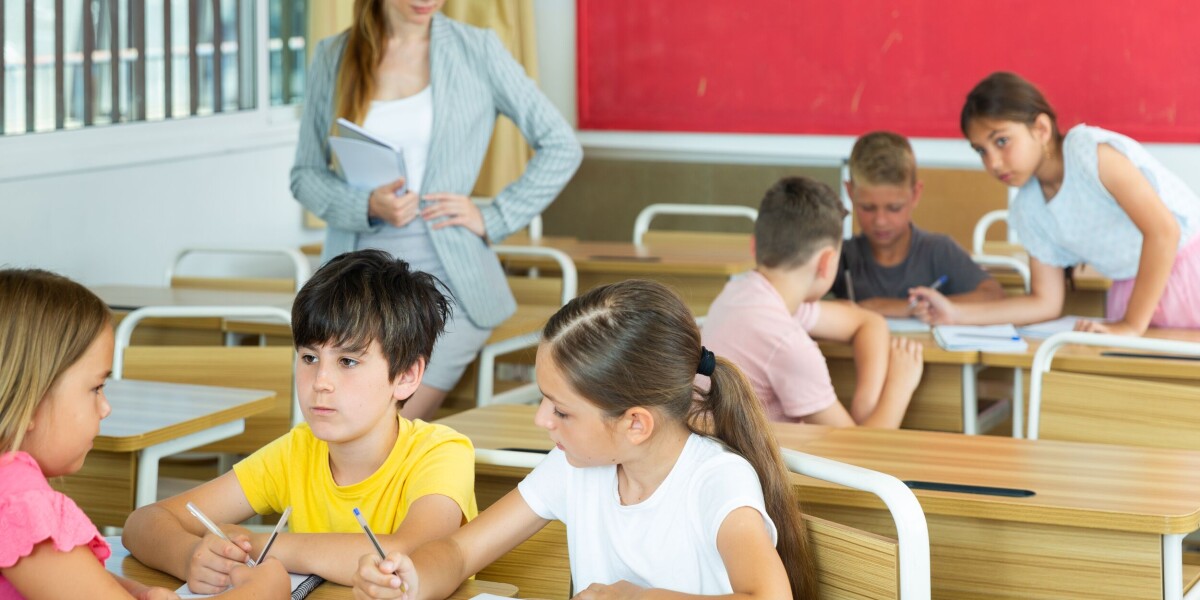What changes in schools for the 2024 autumn rentrée in france
What changes in schools for the 2024 autumn rentrée in france"
- Select a language for the TTS:
- UK English Female
- UK English Male
- US English Female
- US English Male
- Australian Female
- Australian Male
- Language selected: (auto detect) - EN
Play all audios:
SMARTPHONE BAN, MORE ASSESSMENTS, AND NEW SKILLS-BASED GROUPS AMONG MAJOR CHANGES Pupils will return to schools across France next week as the 2024 - 2025 academic year begins. The rentrée
will see a number of reforms for pupils of all ages. These are mostly based on a series of proposals made by current caretaker prime minister Gabriel Attal, when he was Education Minister.
The changes were announced by current caretaker Education Minister Nicole Belloubet at the ‘conférence de Rentrée’ earlier this week. Major – and controversial – changes include more
assessments for primary school children, and a potential nationwide ban on smartphones for pupils. You can see an overview of the changes below, as well as more detailed points underneath.
Pause on secondary school reforms A number of changes to collèges (high schools or secondary schools, for pupils aged 11 - 16) have been postponed or ruled out. These included a reworking
of the ‘brevet’ or high-school diploma (equivalent to GCSEs in the UK) and a requirement for all pupils to obtain a brevet with certain grades before entering lycée (UK college or
sixth-form, for students aged 16 - 18). Teacher training No reforms are scheduled for teacher training courses, but the ministry (when a new government is announced) may review this.
French and maths lessons for younger pupils A reworking of the French and maths syllabuses for children in nursery and the first years of primary school will begin this year. The new
lessons will start from 2025 onwards. More assessments of primary school children Annual assessments of primary school pupils are now required. Previously, exams were only taken every
other year of primary school, but will now be set every year. Unions are particularly against this arguing it increases stress for pupils, parents, and teachers, and removing this measure
is a key demand of strike action, set to take place on September 10. Read more: French teaching unions call for September school strikes New ‘needs groups’ in secondary schools Pupils in
secondary schools will be grouped based on skill level, starting in maths and French classes but then potentially across all subjects. Previously, pupils were placed in classes without
factoring their skills or primary school grades in classes. New rules will see them split into skill levels (renamed groups des besoins or needs groups), with struggling pupils placed
alongside each other, and stronger pupils in their own classes. These new classes – for children aged 11-13, in the first two years of secondary school – are aimed at helping teachers
improve education levels across the board, and will see smaller classes for the struggling groups. Class sizes will be around 15 pupils maximum according to the ministry, but there are no
exact limits stated in the decree passing the new regulations. Alongside a different focus of the curriculum, grouping this way will allow for ‘‘more cross-curricular skills” to be worked,
including “the ability to concentrate, memorise or organise one's work” according to the ministry. Certain teachers are against the changes, seeing them as unfair for struggling pupils
who will have less opportunities to improve than they would alongside stronger classmates. Smartphone ban Finally, trialling a smartphone ban will take place in 200 schools, with the
ministry aiming to roll it out nationally by January 2025. Secondary school pupils will be able to bring their smartphones to school, but must put them in lockers before the day begins,
only being allowed to retrieve them at the end of the day. Read more: France to trial 'no mobile phones' in 200 secondary schools
Trending News
Open relationships: the pros and consYou can also ask open-ended questions, says Robert McGarey, founder and executive director of the Human Potential Center...
France eases covid rules for uk and other non-eu travelFROM MARCH 12, TRAVELLERS GOING BETWEEN FRANCE AND THE UK WILL NOT NEED TO PROVIDE AN ESSENTIAL REASON FOR THEIR JOURNEY...
404 errorMPs vote to end France's ZFE low-emission zones despite government opposition Cross-party majority introduces amendment ...
404 errorMPs vote to end France's ZFE low-emission zones despite government opposition Cross-party majority introduces amendment ...
Secret maps reveal large swathes of scotland are at risk from catastroThe alarming charts have been produced by the environment watchdog Sepa, with the information being made public for the ...
Latests News
What changes in schools for the 2024 autumn rentrée in franceSMARTPHONE BAN, MORE ASSESSMENTS, AND NEW SKILLS-BASED GROUPS AMONG MAJOR CHANGES Pupils will return to schools across F...
Key update on jail break fiasco which saw murderers make daring escapeTHE LAGS AT THE ORLEANS PARISH JAIL YANKED OPEN A FAULTY CELL DOOR, MOVED THE TOILET AND SLITHERED THROUGH THE HOLE IN O...
China, south korea hold maritime talksTime for your weekly round-up of China news: On December 22, China and South Korea held talks on delimiting their overla...
3 apps to help caregivers get organized, find supportOne thing a caregiver needs, other than patience, is a tool to help track and manage the health and well-being of their ...
Valentine's day, "the bachelor" & finding true loveI wrote an article for Christianity.com this week, reflecting upon TV shows like “The Bachelor” and our culture’s quest ...
